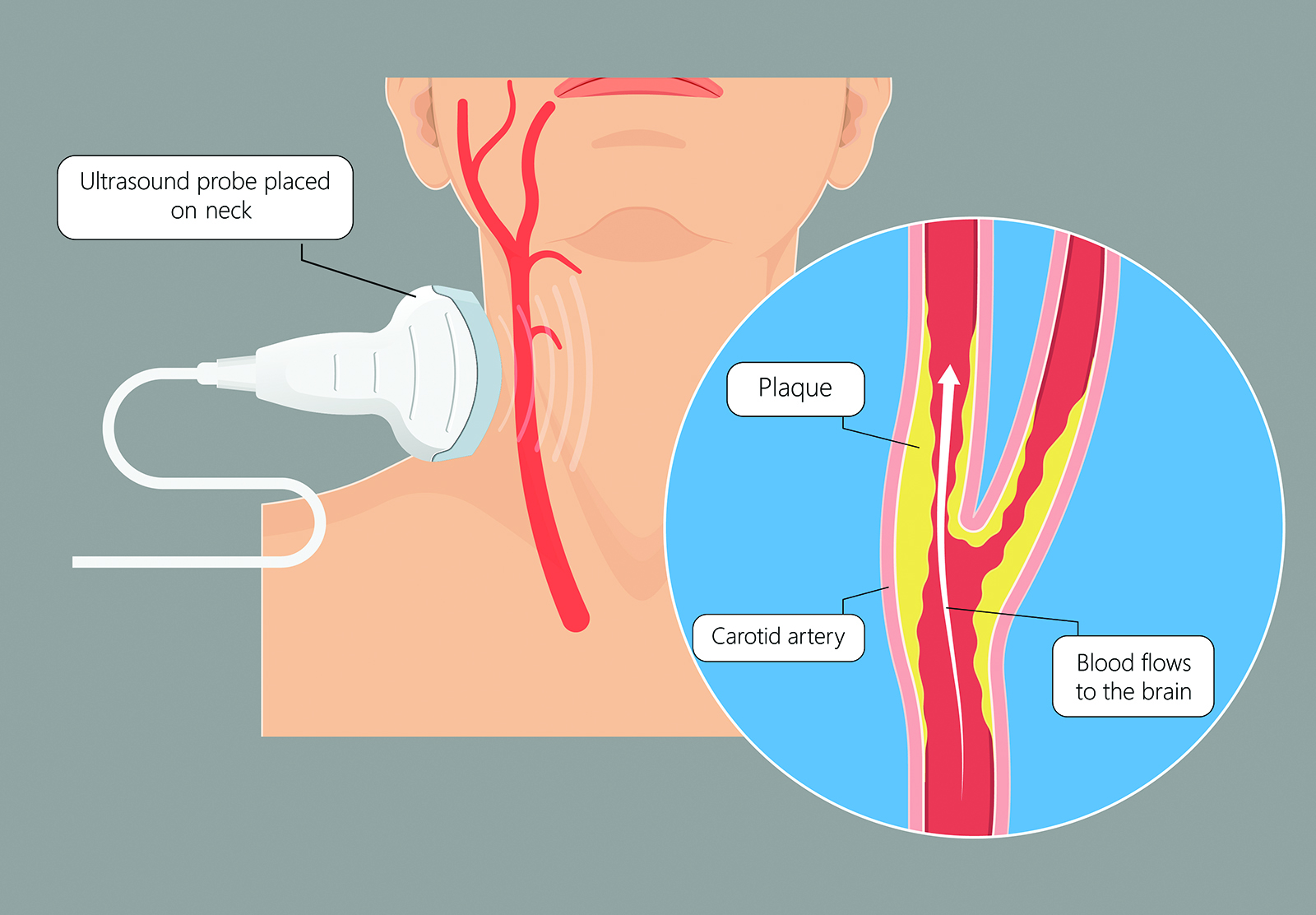Most people know strokes can happen suddenly and cause disability or death. But do you know how strokes are caused? And did you know some people are at risk for suffering stroke during stroke-prevention surgery?
While there are several causes for stroke, it is estimated that up to a third of cases are caused by carotid artery disease – the buildup of plaque in one or both of the arteries in the neck that supply blood from your heart to your brain. When plaque builds up in the carotid arteries, they begin to narrow and blood flow slows down, potentially causing a stroke if blood flow stops or plaque fragments dislodge and travel up to the brain.
"There's no question that certain medications can lower your risk of stroke. Most individuals with artery disease should be on a daily aspirin regimen and cholesterol lowering medications. Statins are a class of drug that can drastically reduce person's risk of heart attack, stroke and even death," says Charles Joels, MD, FACS, RPVI, board certified vascular surgeon with USA Vascular. "In terms of definitive treatment, most people who have an 80 to 90 percent narrowing in their carotid artery – even those who haven't had symptoms of stroke – would benefit from surgery to clean out the artery and restore blood flow.
Treatment options for carotid artery disease depend upon the severity of the overall patient condition and symptoms. The typical standard procedure for treating a blocked carotid artery is a carotid endarterectomy (CEA). This open surgical procedure removes plaque from inside the carotid artery in order to restore normal blood flow to the brain. The surgeon makes an incision on the neck to access the affected artery, opens the artery and removes the plaque. The surgeon closes the artery and the incision in the neck using stitches.
Some patients, however, may be at higher risk of suffering stroke during CEA surgery. That's why USA Vascular is excited to be first in the area to introduce TCAR (tee-car) – a breakthrough technology to treat patients with carotid artery disease who are too high risk for the traditional open procedure.
What is TCAR?
TCAR, or TransCarotid Artery Revascularization, is a clinically proven, minimally invasive and safe approach for high surgical risk patients who need carotid artery treatment. While any repair of the carotid artery carries some risk of causing a stroke because of the repair itself, TCAR was designed to help minimize that risk by keeping potential stroke-causing fragments away from the brain."The goal of carotid artery surgery is to prevent stroke, and there are two types of people who benefit from this surgery. The first is someone who's had a stroke or mini stroke that's caused by a buildup of plaque in the carotid artery. Because they've already had symptoms, there's a pretty high risk of having a more serious stroke in the future," says Dr. Joels. "The other type of patient might have a tightening or narrowing of their blood flow in their carotid, but they don't yet show symptoms. The same procedure is used to prevent them from having a stroke in the first place."
How Does it Work?
In TCAR, a tube inserted into the carotid artery is connected to a system that temporarily directs blood flow away from the brain, to protect against dangerous debris from reaching the brain during the procedure. Any material is captured in a filter outside the body, and surgeons filter the blood before returning it to a vein in the groin.
"After the device is turned on and blood flow is reversed, we proceed in a way very similar to other stent procedures – a guidewire is passed across the narrowing plaque inside the artery and in some cases a balloon is used to open it up. When necessary, a stent is inserted into the artery to hold it open, ensuring adequate blood flow," says Dr. Joels. "Because it's less invasive and takes less time than a traditional surgery and with the added benefit of reduced risk of stroke during the procedure, individuals who have TCAR recover quickly and typically go home the next day – with less pain and smaller scars."
Is TCAR Right for Me?
Anyone who is considered high risk for an open carotid artery surgery would greatly benefit from TCAR, particularly those over the age of 75 who have heart, lung, or kidney disease or who have an obstructed carotid artery on the other side.
"Vascular surgeons are the only specialists who can perform TCAR, and anyone at risk for arterial disease or carotid artery disease, or those who have had a stroke or stroke-like symptoms should be evaluated," recommends Dr. Joels. "The results with TCAR are very good, it's safer than other options, and that's why we use it. Our goal is always to choose the most effective and safest procedure to help our patients live longer and healthier lives."
Get a Carotid Screening to Check for Plaque
USA Vascular provides carotid screenings at several office locations. The simple screening takes about 15 minutes but provides a look and listen in the arteries to check for blockages. A USA vascular surgeon will review the results and go over them with you in a thorough consultation. The carotid screening is offered at a low cash price and can be bundled with other artery screenings. Call USA Vascular Diagnostics at 423-756-1342 for more information.

